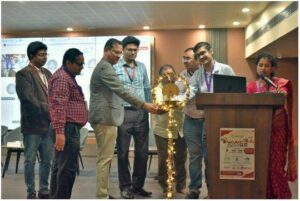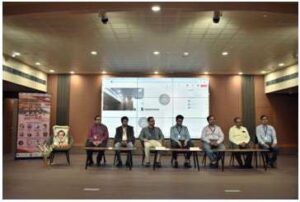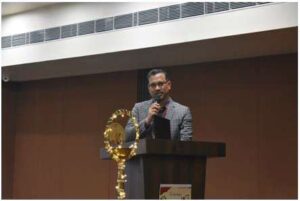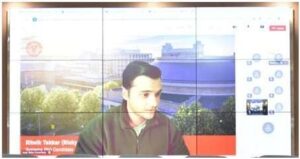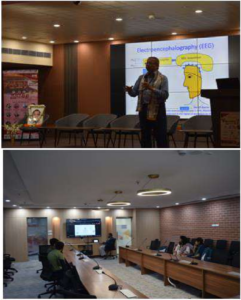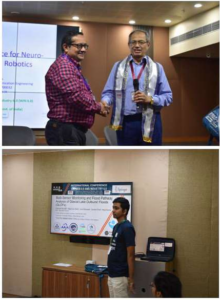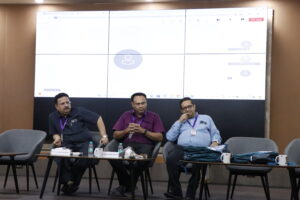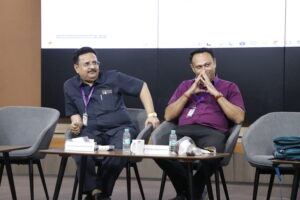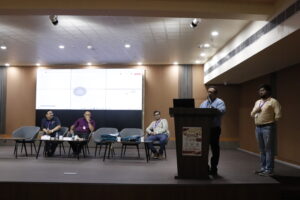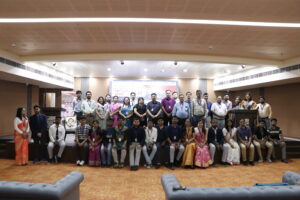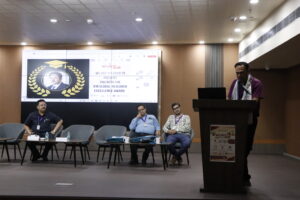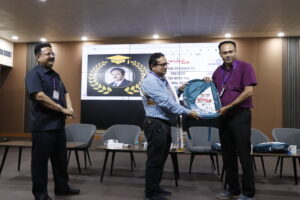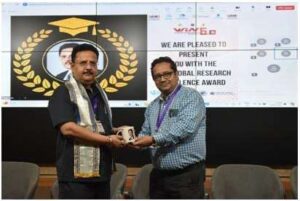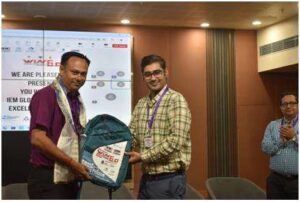International Conference on Web 6.0 and Industry 6.0 (WIN 6.0 2025)
21st - 22nd February, 2025, Kolkata, India
EVENT HIGHLIGHTS
Overview:
The International Conference on Web 6.0 and Industry 6.0 (WIN 6.0 2025) is a premier global event that brings together researchers, academics, and industry experts to explore cutting-edge advancements in Web 6.0 and Industry 6.0 technologies. Over the course of two days (21st 22nd February 2025), the conference featured keynote speeches, technical sessions, and panel discussions covering a diverse range of topics, including artificial
intelligence, block-chain, quantum computing, cyber security, and smart manufacturing.
The conference received an overwhelming response, with over 150 paper submissions, out of which 35 high-quality research papers were accepted and published in Springer Proceedings.
The event commenced with a grand inauguration ceremony, followed by insightful keynote speeches from renowned professionals representing prestigious institutions such as IBM Research, Melbourne University, Cornell University and Nanyang Technological University.
Throughout the conference, technical sessions were held across multiple halls, showcasing groundbreaking research in areas like deep learning, IoT, AI-driven automation, and next-generation web technologies.
Day 1 (21st Feb, 2025), Morning Session:
The first day of the WIN 6.0 Conference 2025 began with a grand inauguration at 9:30 AM, featuring speeches from distinguished guests, including Prof. Banani Chakrabarti (President, IEM-UEM Group), Prof. (Dr.) Satyajit Chakrabarti (Director, IEM-UEM Group), and the chief guest, Prof. (Dr.) Amlan Chakraborti (Professor and Director of A.K.Choudhury School of Information Technology, University of Calcutta, India). The day was packed with insightful keynote speeches in a hybrid mode, starting with Ricky Takkar (Postdoctoral Researcher in the Systems Engineering Program at Cornell University) followed by Dr. Sikhar Patranobis (Cryptographer and Staff Researcher at IBM Research
India), who explored AI-driven cyber security innovations. Three parallel technical sessions Industry 6.0, Web 6.0, and Socio-Technology were conducted in hybrid mode. These sessions were chaired by industry leaders such as Dr.Sanmitra Sarkar (Senior Director & Global Head of Gen AI & Agentic AI, Capgemini) and Dr. Kuntal Dey (Technology R&D Senior Principal, Accenture Technology Labs, Bangalore, India). Researchers presented innovative research on topics such as AI-powered phishing detection, blockchain-based food supply chains, quantum computing, machine learning for weather prediction, and AI applications in mental health. The session concluded with a keynote speech by Dr. Gabor Benedek (Lynx Analytics, Singapore), who discussed the transformative role of Generative AI in Knowledge Graph applications.
Key Moments from Day 1’s Inaugural Session and Ricky Takkar’s Online Keynote Speech
Day 1 (21st Feb, 2025), Evening Session:
The evening session of the WIN 6.0 Conference 2025 featured a dynamic lineup of keynote speeches and technical presentations, focusing on advancements in AI, Web 6.0, and Industry 6.0. Prof. (Dr.) Debabrata Samanta (Program Head and Assistant Professor, Department of Computing and Information Technologies, RIT Kosovo, Rochester Institute of Technology RIT Global Campus, Kosovo) delivered an insightful talk on the evolution of AI, emphasizing how deep learning, Web 6.0, and Industry 6.0 are converging to create intelligent and interconnected systems. This was followed by Prof. (Dr.) Amit Konar (Professor, Department of Electronics and Telecommunication Engineering, Jadavpur University), who presented a compelling lecture on Brain-Computer Interfaces for Neuro-Motor Rehabilitative Robotics, highlighting the potential of AI-driven assistive technologies in medical rehabilitation. Later, Prof. (Dr.) Phillip Bradford (Associate Professor-in-Residence in Computer Science at the University of Connecticut) and Dr. Erik Cambria (Professor at Nanyang Technological University) delivered their keynote speeches, delving into AI-driven decision-making, sentiment analysis, and the evolving landscape of intelligent computing. Their talks provided valuable insights into how AI-powered systems are shaping the future of human-computer interaction, enhancing automation, efficiency, and predictive analytics across industries. The technical sessions, chaired by Prof. (Dr.) Jadav Chandra Das, Prof. (Dr.) Santanu Phadikar, and Prof. (Dr.) Goutam Kumar Pal, showcased groundbreaking research on AI-security, healthcare, and robotics. These discussions underscored the transformative impact of AI and emerging technologies, driving forward innovation in various domains.
The session concluded with a vote of thanks, acknowledging the contributions of distinguished speakers, researchers, and participants. The evening wrapped up with a networking session, providing attendees with an opportunity to exchange ideas, foster collaborations, and explore future research possibilities, setting the stage for further advancements in AI and technology.
Here are some highlights from the keynote presentations and paper presentations of Track 1.
Day 2 (22nd Feb, 2025), Morning Session:
The second day of the WIN 6.0 Conference 2025 commenced with a series of insightful keynote speeches and technical discussions, continuing the momentum from Day 1. The morning session began at 10:00 AM with a keynote speech by Prof. (Dr.) Rajkumar Buyya (Fellow IEEE, Fellow Academia Europaea, Distinguished Professor at Melbourne University, Australia). He provided an in-depth analysis of cloud computing, edge computing, and AI-driven data processing, highlighting the latest research trends and future directions in these fields. His session was well-received, engaging the audience with practical applications and case studies from leading tech industries.
Following this, Prof. (Dr.) Debashis De (Professor, MAKAUT, India) delivered an in-person keynote speech from 11:00 AM to 11:40 AM, where he discussed the integration of AI and IoT in smart city applications. His presentation explored energy-efficient computing, intelligent transportation systems, and AI-driven environmental monitoring, providing valuable insights into how emerging technologies are reshaping urban infrastructures. The technical session, chaired by Dr. Sanmitra Sarkar, Dr. Amitava Nag, and Dr. Rajat Kumar Pal, covered a diverse range of research topics, including AI-powered QR code phishing prevention, deep-learning advancements for sign language interpretation, and the development of quantum communication models. Researchers presented their findings on next-generation marketplaces, real-time inventory control solutions, and AI-based fake news detection models, demonstrating cutting-edge advancements in artificial intelligence, cyber
security, and block chain applications.
Here are some notable Insights from the Morning Session of Day 2.
Day 2 (22nd Feb, 2025), Evening Session:
The evening session of Day 2 at the WIN 6.0 Conference 2025 featured a compelling mix of keynote speeches, technical presentations, and discussions on the latest advancements in AI, Web 6.0, and Industry 6.0. The session began at 2:00 PM with a keynote speech by Prof. (Dr.) Matthew Chua from National University of Singapore (NUS), who delivered an insightful talk on the intersection of AI and healthcare innovations. He highlighted AI-driven diagnostic tools, predictive analytics in patient care, and the role of machine learning in precision medicine, offering a glimpse into how emerging technologies are transforming healthcare. Following this, Mr. Aninda Bose, Executive editor at Springer and Nature group of London, UK, took the stage at 2:30 PM to discuss the role of publishing in advancing scientific research. His talk focused on best practices for researchers in AI and technology to publish impactful work, along with an overview of trends in academic publishing, ethical considerations, and the importance of interdisciplinary collaboration. His session provided young researchers with valuable insights into navigating the research publication process in high-impact journals. The technical sessions, chaired by Dr. Nabojyoti Majumder, featured a diverse range of groundbreaking research presentations. Topics covered included AI-enhanced form validation systems, quantum computing applications in cybersecurity, and machine learning models for early- . Researchers also introduced new
methodologies for deep-learning-based fake news detection, advancements in IoT-integrated smart healthcare solutions, and AI-powered multimodal gesture recognition systems. These discussions provided valuable insights into real-world applications of AI and emerging technologies in various sectors. Later, Prof. (Dr.) Sandip Singh Sengar (Senior Lecturer and Head of Computer Vision and Artificial Intelligence, Cardiff Metropolitan University, UK) explored advancements in AI-driven smart automation and predictive analytics, highlighting their transformative impact across industries.
Some glimpses of day 2 evening session
Valedictory Session:
The day’s events concluded with a valedictory session, featuring a thought-provoking talk by Prof. (Dr.) Siddhartha Bhattacharya (Senior Researcher at VSB – Technical University of Ostrava, Czech Republic) and Prof. (Dr.) Jyoti Sekhar Banerjee (Head, CSE (AI & ML), Bengal Institute of Technology & Remote Researcher, ITHACA Lab, UOWM, Greece). They reflected on the key takeaways of the conference, emphasizing the impact of AI, automation, and digital transformation on future technological advancements. Their discussion highlighted the importance of interdisciplinary collaboration and the role of AI-
driven innovations in shaping industries and society. The evening session wrapped up with a vote of thanks, acknowledging the contributions of all keynote speakers, researchers, organizers, and participants. This was followed by a networking session over high tea, where attendees had the opportunity to exchange ideas, explore research collaborations, and discuss emerging trends. The session marked a successful and impactful conclusion to Day 2 of the WIN 6.0 Conference 2025, setting the stage for continued advancements in the field of AI and technology.
A few glimpses from the Valedictory Session.
IMPORTANT DEADLINES
- Full Paper Submission (revised)- Closed
- Acceptance Notification- 12th February , 2025
- Early Bird Registration- 14th February, 2025
- Camera ready paper submission- 3rd March, 2025
- Registration- 16th February, 2025
- Conference Date- 21st-22nd February, 2025
ANNOUNCEMENTS
Best Paper Award Will be Given for Each track.

